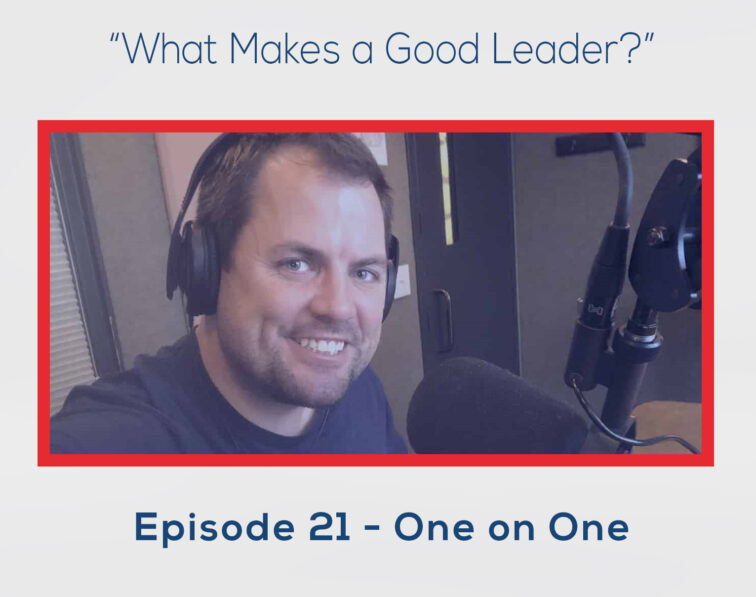Behind the Billboard S1EP21
(0:00:00) Intro: Welcome to the Behind The Billboard podcast. Here’s your host, Kris Lindahl.
(0:00:06) KL: What makes a good leader? I wanted to go over some of the characteristics that I’ve identified in successful leaders that I’ve had the opportunity to spend quite some time with.
The first one is, emotional intelligence. Your EQ. This isn’t your IQ. Your IQ is a fixed number. This is your EQ. This is your ability to understand others, understand energy around you, to really feel what’s happening. I’ve found successful leaders can feel the energy in a room. They can feel when people are down. They have the ability to lift people up. They can feel when an organization is burnt out. They can feel when people are stressed. They can feel when people are grieving. And they have the ability to change that energy. It’s a very, very special characteristic— one that matters so much in leading people. You have to have a high EQ because there are ups and downs in life and in business. We get served curve balls every single day but you have to have the ability to detect that energy and then change the room. It’s a powerful thing when you can go into a room and you can detect the energy and you can change it for the better. I’ve noticed that successful leaders have a really high EQ.
The next one is confidence. Confidence is so important in leadership. I look at so many leaders and mentors that I’ve been fortunate enough to be connected to and they’re confident. They are confident in their decisions. Are they always right? No. But they’re confident. If you’re going to go to war and your general is not confident and runs to the back of the lines and goes, “This isn’t going to go good. I don’t know! We’re probably not going to win!”
How would you feel if your leader was leading you that way versus having a leader that says, “We’re going to get through this! We’re going to own this! We’re
going to take over! We’re going to crush it! We have no worries. The economy doesn’t matter. We create our own economy. We’re going to be just fine.”
Big difference in how that feels! I’ve noticed that successful leaders. Are confident. Now confidence is different than cocky or egotistical. No one wants to be a part of an organization that has a leader that has a massive ego or is super cocky. They want someone that is confident but not cocky. Two different things.
The next one is, and this one can happen within your organization, within your life. It could happen in one of your co-worker’s lives but it might come into your life and that’s to neutralize toxic people.
We’ve had some people in our organization that weren’t culture fits for what we were doing. That doesn’t make them bad people or that they won’t be successful. They were toxic to our organization. Successful leaders have the ability to neutralize toxic people. Some organizations where they don’t have a. Strong leader, that toxic person could do some damage to the culture or to the organization. When you have a successful leader, they know how to neutralize that person. They know how to calm them down. They know how to not allow that person to be a threat. If you’re looking to grow as a leader, toxic people in your organization can be a big challenge and depending on the size of your organization or depending on the type of organization you have, removing toxic people might take some time. The way to do that sooner rather than later is to neutralize them. I’ve noticed that successful leaders have the ability to do that.
The next one is, if you think about business and you think about the organization that you lead and that you’re a part of, is that there’s a lot of change. When you are innovating and as the world changes, I think that pretty much every industry is changing very quickly right now. Successful leaders have the ability to embrace change, not only for themselves, but for their organization.
“We’re going to get through this together! We’re going to be better! We’re going to solve this! We’re going to get to ‘this’ level! Change is good! Everyone should feel good! We’re going to be just fine!”
They do a really good job of embracing change. So, remember that one. As you’re leading an organization and you’ve got a lot of change that’s going on, what you don’t want to have happen is that you don’t want people to have whiplash where you’re bouncing all over the place. You’re bouncing off every single wall. By the end of all this change, everyone is dizzy. They’re not sure what they’re doing. There’s confusion. Embrace that change and bring that confidence back to them.
The next one is one that’s very difficult for so many, especially leaders that are givers, and that is “the power of no.”
I’ve noticed that successful leaders have the ability to say no or they empower someone else, whether that’s an admin or an assistant that can say no on their behalf, because the reality is is we only have so much time in a day and it comes down to choices. I’ve regretfully had to say no things that I didn’t want to say no to but I knew that it wasn’t going to get our organization to the next level. It’s tempting to accept appointment after appointment after appointment or this-new- shiny-idea, or that-new-shiny-object, an there are things the are coming all the time but at some point you have to have someone or yourself, you have to protect your calendar and use the word “no.”
It’s not easy because we’ve been trained that the word “no” disappoints and we let someone down. So make sure that you have a strategy in place to produce the word “no.” It will make a big difference and it will help your organization get to the next level.
This one is one that we really try hard to use and focus on in our organization and I would say that the people in our organization have done a fantastic job with this. We have amazing people. And that is… embrace failure.
Failure can be looked at different ways. For some people, failure is… it’s over. I lost. it’s not going to work for me. But the way that we look at it, is that it’s a learning opportunity. If you’re going to grow as a person and you’re going to grow your business and you’re going to grow your department or whatever position you’re in as a leader, those relearning opportunities. Those moments where you
fail or your organization fails or someone close to you fails, that’s an opportunity to learn. I look back at those pivotal moments in my career and things that have happened to me personally because those moments define me. And they continue to define me and I embrace failure so much because that’s how I grow. As a leader, if you’re looking to get to that next level, you have to be okay with failure because everyone fails. The difference is how people respond to it. If you get down in the dumps and your mindset goes and you don’t feel like you’re making an impact anymore, it’s going to be difficult. But if you look at it like, “I can’t wait until the next moment where I fail where I can learn more about myself, about my organization…” that’s when it gets exciting! That’s where you can learn from those moments! And people watch when you fail how you respond. Remember that! People watch how you are, how you respond, when you fail. So if you’re leading others, make sure you use those as learning opportunities.
And then the next one is, positivity and joy. Positivity is critical part of leading an organization. Successful leaders are always bring joy. No matter how bad it is. No matter how bad they’re struggling. They’re going to have fun and they are going to bring massive joy to the organization and the people around them and they’re going to lift everyone up. So if you want to be a successful leader or you want to take your leadership ability to the next level, you have to bring massive levels of joy. You have to be so amped up and so “on” at all times that it gets everyone excited! When you have people excited and you have people having fun, you create that community where people want to be and that culture, it will make a big difference in the output that you get from people. People want todo more when they’re having fun and they’re part of something that’s special.
I think of our organization and I think of how special those people are. I think of how special those families are that support that the people in our organization. I think about the output that we get. We are at the highest level and are absolutely crushing it and it’s because of those people that feel good. They bring joy. And that what happens when you bring that level of joy and you bring that positivity, it takes on a life of its own. And now all of a sudden, everyone in your organization is focusing on the glass being half full. So don’t forget to bring that positivity.
(0:10:37) Outro:
And then the last one, which goes a little into the motional intelligence, is empathy. You have to be empathetic. No one wants to work for a dictator. You have to be empathetic and you have to really focus on being right next them, boots on the ground, and really honor them and show them that you care. Being a successful leader in today’s world is so different than it was 20 years ago where you would jsut bark order and tell people, “You need to do this! You need to do that!”
No one wants to work for that sort of leader anymore They want to feel right along side. They want some compliments and they want people to be empathetic and really giving back that energy like, “Hey! I really noticed you did that!”
Or “I love that you did this!”
Using those powerful words and acknowledging people makes a huge difference. And don’t forget to publicly acknowledge people in your organization for helping you. I think too often as leaders we don’t say thank you enough and we don’t show enough empathy. In reality, we wouldn’t be where we are without them. So make sure that you don’t forget that as the success of your organization grows, remember the people that helped get you there and show them empathy. They deserve it. That will make a huge difference in how people are and how they treat you and really, how long they stay, because when they feel cared about and they can feel that you empathize with them, it will make a massive difference in the output you get from your people. And just love on your people! Love your people! With the people you wouldn’t be where you are. So, don’t forget that!
I hope that things were helpful! These are just some of the things that I’ve had the opportunity to learn from other leaders and mentors in my life. But I believe these ones are what make a great leader!
Outro: If you loved this episode, give us a great review, subscribe and share us socially so we can spread the word and build a community of “difference-makers” and if there’s a leader who inspires you, send your suggestions for future guests to Kris’ team at BehindTheBillboard.com so we can get better.









